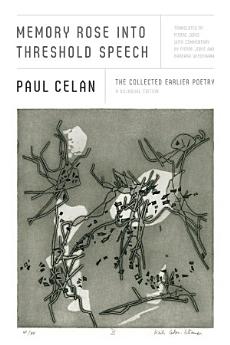Memory Rose into Threshold Speech: The Collected Earlier Poetry
About this ebook
Celan, a Bukovinian Jew who lived through the Holocaust, created work that displays both great lyric power and an uncanny ability to pinpoint totalitarian cultural and political tendencies. His quest, however, is not only reflective: there is in Celan's writing a profound need and desire to create a new, inhabitable world and a new language for it. In Memory Rose into Threshold Speech, Celan's reader witnesses his poetry, which starts lush with surrealistic imagery, become gradually pared down; its syntax tightens and his trademark neologisms and word formations increase toward a polysemic language of great accuracy that tries, in the poet's own words, "to measure the area of the given and the possible."
Translated by the prize-winning poet and translator Pierre Joris, this bilingual edition follows the 2014 publication of Breathturn into Timestead, Celan's collected later poetry. All nine volumes of Celan's poetry are now available in Joris's carefully crafted translations, accompanied here by a new introduction and extensive commentary. The four volumes in this edition show the flowering of one of the major literary figures of the last century.
This volume collects Celan's first four books: Mohn und Gedächtnis (Poppy and Memory), Von Schwelle zu Schwelle (Threshold to Threshold), Sprachgitter (Speechgrille), and Die Niemandsrose (NoOnesRose).
Ratings and reviews
- Flag inappropriate
About the author
Paul Celan was born in Czernowitz, Bukovina, in 1920, and is widely considered to be one of the most innovative poets of the twentieth century. A German-speaking Jew, he was sent to a forced labor camp during World War II. Celan settled in Paris in 1948, where he lived and wrote until his death in 1970.
Pierre Joris has written, edited, and translated more than sixty books, including poetry, essays, and anthologies, such as Fox-trails, -tails, & -trots (Poems & Proses); Paul Celan's Microliths They Are, Little Stones: Posthumous Prose; Arabia (not so) Deserta; and, with Adonis, Conversations in the Pyrenees. He is the editor and translator of Paul Celan's Breathturn into Timestead: The Collected Later Poetry. In 2005 Joris received the PEN Award for Poetry in Translation for his translation of Celan's Lichtzwang (Lightduress), and in 2020 he received Luxembourg's Batty Weber Prize for lifetime achievement.





